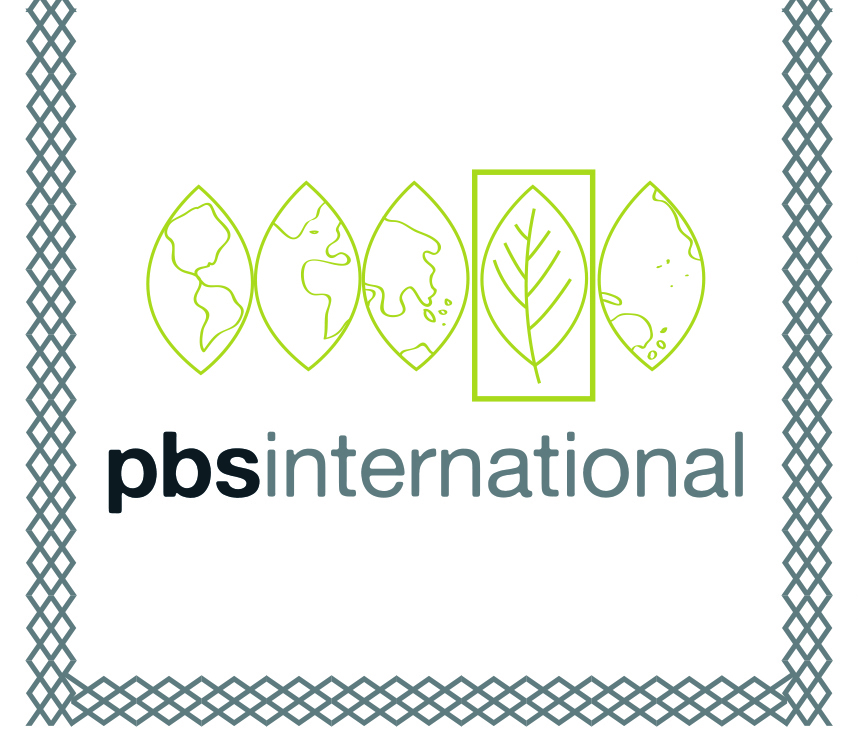At the National Association of Plant Breeding (NAPB) 2024 meeting Hannah Senior caught up with Professor Ksenija Gasic, to find out how PBS International’s pollination control tents are helping Clemson University to develop tomorrow’s disease-resistant peach rootstocks.
Clemson Peach Breeding Lab
While not as synonymous with peaches as its neighbour Georgia, South Carolina produces more of the fruit and ranks second only to California in fresh market peach production in the USA. Dr. Ksenija Gasic, Professor of Horticulture, Peach Genetics and Breeding leads Clemson University’s Peach Breeding program. The lab plays a key role in advancing the peach industry, providing valuable information to academia, the public, and commercial peach growers alike.
When Ksenija joined Clemson in 2008, she restarted the peach breeding program after more than 25 years of dormancy.
“Clemson was known for its molecular geneticists specializing in Prunus genetics. They had pathologists, virologists, and horticulturists, all focusing on peach but no breeder. So, I completed the group,” Ksenija explains. “I was able to apply their research findings into developing cultivars that address the challenges industry identified.”
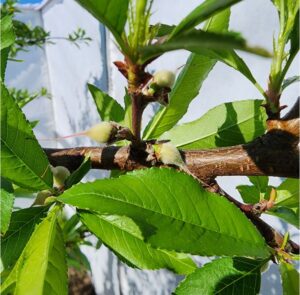
Regional challenges
The Southeast has a unique climate, characterized by hot, humid summers that enable pests and diseases to flourish. The limited availability of land leads to frequent replanting on the same plots, worsening these issues. Additionally, climate change has brought warmer winters, which have already disrupted peach production in Florida and Georgia.
Peach cultivars bred outside the Southeast region often struggle to cope with these pressures. “They fail miserably,” notes Ksenija, whose mission it is to create peach trees that combine the established quality with the disease resistance required by the southeast growers.
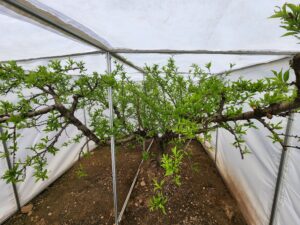
Disease resistance and an underground enemy
South Carolina peach trees are grown on a rootstock known as Guardian®, onto which other peach varieties are grafted. Guardian® rootstock is bred for tolerance to nematodes and the Peach Tree Short Life syndrome, but it is susceptible to a fungal infection called Armillaria root rot, which attacks the tree below the soil surface. Armillaria is notoriously difficult to study and can take six or seven years before the signs of infection show in the field.
Root rot caused by the fungus is the primary cause of premature peach tree decline in South Carolina and Georgia. It is responsible for the loss of an estimated 3-4% of peach trees annually, which translates to a cost of around $8 million every year.
To combat the devastating effects of root rot the Clemson team are developing a Guardian-like rootstock resistant to Armillaria. They identified Armillaria tolerance in wild plum populations—a close relative of peaches. By crossing Guardian® and resistant plum species together, they intend to create interspecific Armillaria-tolerant crops. However, there have been some hurdles along the way.
A surprising source of peach tree pollination
Plant breeding literature says that Prunus pollen is too heavy to be wind-borne and can only be spread by pollinators. But when the team manually pollinated insect-free peach trees with plum pollen, the resulting fruit turned out to be 100% peach. Wind-borne pollen had reached the trees – a problem that cost the Peach Team two or three years of work.
A second issue arose when the team introduced pollination control bags to prevent unwanted pollen transmission by either wind or insects. As peaches are self-compatible, they need to be emasculated for controlled pollination. The combination of bags, weather conditions, and the exposed fragile plant organs caused too much damage to allow a successful fruit crop.
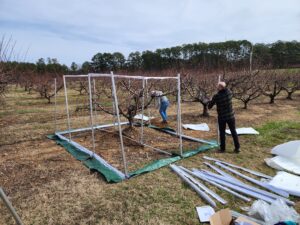
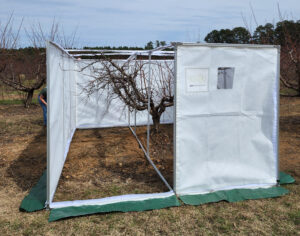
Innovative Pollination Control Solutions
In the U.S., pollination control methods are primarily designed for field crops, making suitable alternatives to standard pollen bags hard to find. Running out of time, Ksenija looked to overseas suppliers and eventually sourced pollination tents from PBS International. “I said, OK, we are pollinating in March. Fly it here, we need it!” she recalls.
Ksenija was impressed with the design of the Citadel Maxi Pollination tents, which are two meters tall, have a door for easy access and can accommodate pruned trees. “My crew found the tent easy to assemble and disassemble. We had issues with our makeshift tents when the wind would blow them over,” she explains. “But this tent is light and has sturdy anchor straps to keep it steady on the ground.”
Clemson’s procurement department were keen to know the life span of the tent. ‘’The administration needed to know if the tent would last more than one year, it should last a decade and the panels are good for at least two years, maybe more,” says Ksenija. “What I like about it is that I do not need to buy a whole tent. I can buy the panels, which is much more economical. We know to roll it, not fold it for storage so that it will last longer.”
Peach x Plum Cross-Breeding
With the pollination issues resolved, the team was ready to grow hybrid fruit.
Fruit from interspecific crosses often abort because of genetic incompatibility and the pollination success is low. So, to maximise the chance of success, the team bred fruits with plum mothers and peach fathers, and others with peach mothers and plum fathers. The resulting seeds are now in embryo culture going through dormancy and germination before they can be inoculated with Armillaria spp. to see if any resistance-promoting genes will shine through.
It may take years before a resistant version of Guardian® can be brought to market, but Ksenija is prepared. “This is a long process,” she says. “I need to create a massive number of progeny to get a chance at the combination of traits that I like, and a lot of tests are needed.” Fortunately, finding pollination control solutions is no longer one of the challenges along the way.
Hear more from Ksenija about what inspired her career on our podcast
Read more about PBs International Citadel Pollination Control Tents
